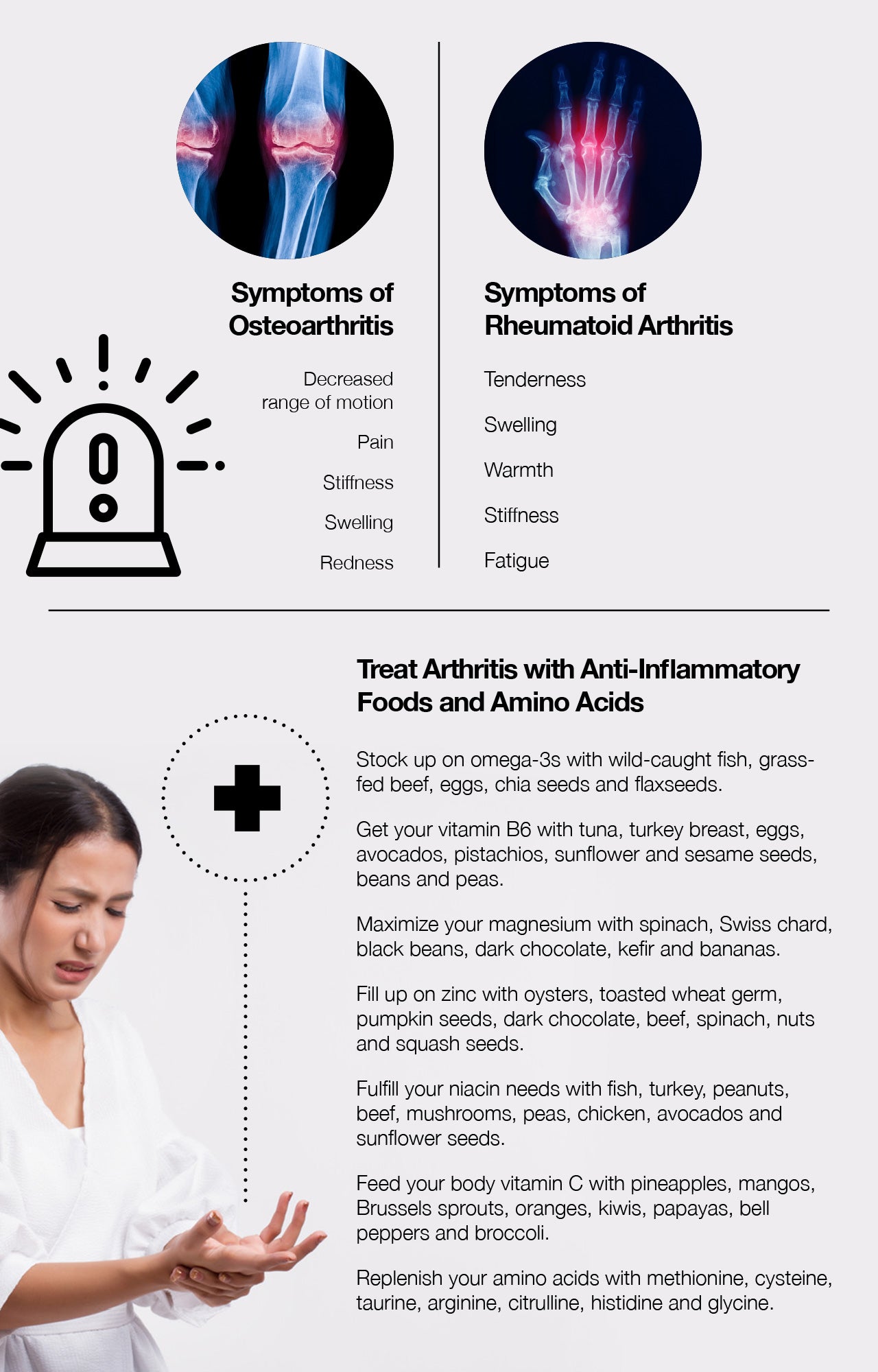Amino Acids for Arthritis: Nature’s Answer for Better Pain Relief?
 By: by Amino Science
By: by Amino Science

If you have arthritis, you know how the joint pain and inflammation can negatively affect your day-to-day life. Whether it’s your ability to walk or simply open a jar, arthritis can make your life miserable. In fact, arthritis is the number one cause of disability in adults in the United States. However, it is possible to reduce the impacts of arthritis on your life. And in this article, we’re going to take a look at amino acids for arthritis and discuss the role these building blocks of protein may play in both pain relief and the prevention of joint damage.
What Causes Arthritis?
According to the Arthritis Foundation, more than 50 million Americans have some form of the more than 100 different types of arthritis (and associated conditions). But the most common types of arthritis are by far osteoarthritis and rheumatoid arthritis.
Osteoarthritis
Osteoarthritis, or degenerative joint disease, is the form of arthritis we’re all probably most familiar with. This type is caused by wear and tear on joint cartilage—the firm, flexible connective tissue that provides a protective cushion at the ends of long bones, where they meet at the joint.
If the wear and tear on cartilage progresses far enough, the ends of the bones can eventually begin to grind against one another. This damage can be the result of a number of causes, including:
- Overuse
- Injury
- Anatomic abnormalities
- Obesity
- Diabetes
- Genetic predisposition
- Weak supporting muscles
Osteoarthritis can affect any joint, but it’s particularly common in the knees, hips, lower back, neck, fingers, thumbs, and great toes.
Rheumatoid Arthritis
Rheumatoid arthritis is an autoimmune disease in which the immune system attacks the synovial membrane—the lining of the joint capsule. If the disease process is allowed to continue, the constant inflammation can eventually degrade both the cartilage and the bone itself to the point that the joint becomes immobile and deformed.
Several factors can increase a person’s risk of developing rheumatoid arthritis. These include:
- Sex: Women are more likely than men to develop rheumatoid arthritis.
- Age: Middle-aged adults are more likely to have rheumatoid arthritis.
- Family history: People with family members with rheumatoid arthritis are more likely to develop the disease themselves.
- Tobacco: People who smoke have a greater risk of rheumatoid arthritis, especially if the disease runs in the family.
Amino Acids for Arthritis
The good news for arthritis sufferers is that studies have shown that certain nutritional supplements, including amino acids, can support cartilage and joint health, provide pain relief, and make physical activity more comfortable.
Seven amino acids, in particular, play an important role in maintaining joint health. These are:
- Methionine
- Cysteine
- Taurine
- Arginine
- Citrulline
- Histidine
- Glycine
1. Methionine
Joint cartilage can’t form without sulfur. And for arthritis patients, a lack of sulfur can have devastating consequences. In fact, studies have shown that the cartilage of healthy people contains approximately three times more sulfur than the cartilage of individuals with arthritis.
Methionine is a sulfur-containing essential amino acid that encourages cartilage cells to create more cartilage tissue and helps strengthen joints by forming sulfurous chains that link together.
Methionine has also been shown in studies to help ease symptoms of arthritis by acting as both an anti-inflammatory and an analgesic.
A 2002 study in The Journal of Family Practice investigating the efficacy of the nutritional supplement S-adenosylmethionine (SAMe)—which is composed of methionine bound to a molecule of adenosine triphosphate (ATP)—found that SAMe worked as well as nonsteroidal anti-inflammatory drugs (NSAIDs) at decreasing pain and functional limitations, but without the adverse effects seen with NSAIDs.
In addition, a 2004 clinical trial found that SAMe supplementation was as effective at reducing the pain caused by knee osteoarthritis as the prescription NSAID celecoxib. And like the earlier study, this study also found that SAMe was able to improve joint pain without the side effects seen with celecoxib.
Good food sources of methionine include:
- Meat
- Poultry
- Fish
- Eggs
- Dairy products
- Brazil nuts
- Sesame seeds
- Broccoli
- Onions
Some studies have suggested that ingesting methionine at levels 5 times the normal dietary intake can lead to an increase in plasma levels of homocysteine, which may have adverse health effects. However, it’s thought that the possibility of this happening through normal dietary intake is quite low.
2. Cysteine
Like methionine, cysteine is an amino acid that helps produce sulfur in the body. It’s also considered a nonessential amino acid because it’s created in the body from methionine.
Cysteine—which is available in supplement form as N-acetylcysteine (NAC)—has potent antioxidant properties that protect cells from oxidative stress. It also supports the immune system and helps stimulate the production of collagen—a structural protein required for the building of joint cartilage.
In addition, cysteine supplementation may help improve joint flexibility in those with rheumatoid arthritis.
Dietary sources of cysteine include:
- Meat
- Poultry
- Eggs
- Dairy products
- Onions
- Lentils
- Oatmeal
- Sunflower seeds
3. Taurine
Taurine is the most abundant free amino acid in the body and functions as both an antioxidant and anti-inflammatory. It’s also essential for cardiovascular and skeletal muscle function. Like methionine, taurine is a sulfur-containing amino acid and requires cysteine for its production.
Studies have suggested that taurine may also have a role to play in the treatment of chronic inflammatory diseases. For example, a 2018 study found that taurine diminishes the severity of inflammatory diseases, including arthritis.
Similarly, another study from the same year demonstrated that injections of taurine relieve symptoms of osteoarthritis in rats, including pain and swelling, and inhibit cartilage degeneration.
The best food sources of taurine are animal-based, so vegetarians and vegans are at greater risk of deficiency. Taurine food sources include:
- Meat
- Poultry
- Shellfish
- Dairy products
4. Arginine
Arginine is an anti-inflammatory amino acid that helps calm the pain associated with joint inflammation by strengthening the immune system and supporting the production of nitric oxide (NO). NO acts as a vasodilator, relaxing blood vessels and improving circulation and nutrient delivery to the joints.
For extra arginine in your diet, look to:
- Meat
- Dairy products
- Soybeans
- Chickpeas
- Lentils
- Peanuts
- Pumpkin seeds
5. Citrulline
Citrulline is an amino acid that has the same anti-inflammatory benefits as arginine because it converts to arginine in the kidneys. However, while arginine is quickly metabolized when taken as a nutritional supplement, it takes longer for the body to break down citrulline.
Interestingly, citrulline also causes blood levels of arginine to rise higher than those seen when taking arginine. Therefore, citrulline may be even more effective for increasing amino acid concentrations of arginine in the blood.
Food sources of citrulline include:
- Meat
- Beans
- Onions
- Garlic
- Watermelon
- Dark chocolate
- Nuts
6. Histidine
Histidine is another amino acid with anti-inflammatory benefits. Studies have found that people with rheumatoid arthritis have lower baseline serum levels of histidine. Though research is limited, these studies also suggest that histidine supplementation may be helpful for arthritis symptoms in some individuals.
Good food sources of histidine include:
- Meat
- Poultry
- Fish
- Eggs
- Whole grains
- Dairy products
- Beans
- Nuts
- Seeds
7. Glycine
The major amino acid constituents of collagen are glycine, lysine, and proline. And of these, the nonessential amino acid glycine is the most abundant, accounting for one third of the amino acids present.
A 2018 study found that while the effects of proline and lysine on collagen production appear to reach their maximum at normal physiologic levels of these amino acids, increasing dietary consumption of glycine by 10 grams could result in an increase in collagen synthesis of approximately 200%.
Moreover, glycine helps the body make glutathione—the so-called master antioxidant—and acts as an immunomodulator, which can be especially helpful in autoimmune diseases like rheumatoid arthritis.
Food sources of glycine include:
- Meat
- Poultry
- Gelatin
- Egg whites
- Sesame seeds
Whatever amino acid or combination of amino acids you decide is right for you, it’s important to remember that every amino acid works best when used as part of a formula that contains all nine essential amino acids. Not only does this prevent an imbalance in amino acid levels, but it also helps ensure the body has all the building blocks it needs to create the proteins required to maintain overall health and well-being.


Up to 25% off Amino
Shop NowTAGS: conditions natural cures
Join the Community
Comments (0)
Most Craveable Recipes




 833-264-6620
833-264-6620



















